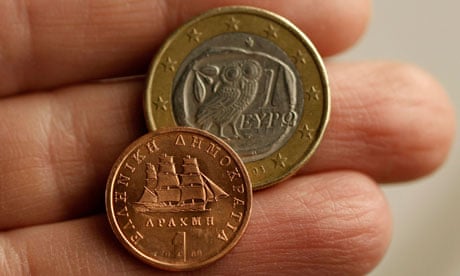Critical talks aimed at forging a government of national unity in crisis-hit Greece will continue on Tuesday with a meeting of all party leaders, after the country's political uncertainty saw markets plunge and fears rise over Athens' ability to stay the course in the eurozone.
President Karolos Papoulias's decision to prolong the negotiations came despite widespread signs that the talks were heading towards collapse. He met the leaders of the conservative New Democracy, socialist Pasok and Democratic Left parties in the eighth day of talks to resolve the deadlock. The party chiefs said the president had suggested creating a government of technocrats or "personalities".
But one well-placed official said: "Everyone recognises there will not be an agreement. They are just going through the motions. We are going to go to a new round of elections and the sooner the better."
Even before the political leaders arrived at the presidential palace, the prospect of the discussions producing a successful outcome had been quashed by the small Democratic Left party.
Athens' political impasse, the result of inconclusive elections on 6 May, could not be resolved, a senior party member told the Guardian, because the Democratic Left was unable to join an administration that did not reflect "the majority of Greek society".
"The last thing Greece needs is another round of elections but that is what is going to happen. We have decided that we cannot participate in a government that does not reflect the majority will of Greek society," said Dimitris Hadzisokratis, who sits on the party's executive board.
"I say this with a heavy heart. We would have preferred otherwise," he said, adding that nearly 70% of Greeks had voted for political groups that were opposed to the policies the new government would be forced to adopt under pressure from the EU and IMF keeping Athens' insolvent economy afloat.
Without the support of Democrat Left, a decidedly "pro-European" force which won 19 seats in parliament, the New Democracy party and centre-left Pasok party fall two seats short of being able to achieve a workable majority.
Syriza, an alliance of leftists and ecologists that emerged as the poll's surprise runner-up – and has since seen its popularity surge on the back of anti-austerity sentiment – rejected the idea of participating in a government that it claimed was bent on "destroying Greece". Alexis Tsipras, Syriza's young firebrand leader, refused to even attend the negotiations.
Papoulias has until Thursday, when parliament reconvenes, to broker a deal. But another well-placed official said it was certain that any hope of the well-respected head of state acting as a deus ex machina in the unfolding Greek drama had been effectively dashed. With bank reserves drying up, liquidity at an all-time low and state revenues dropping precipitously because of the instability, the situation had been exacerbated by growing alarm over the economy.
"The economy is in bad shape," he said. "Our fear is that there could be a run on Greek banks very soon unless their recapitalisation begins immediately."
The prospect of a new poll, possibly as early as 10 June, has reinforced Greek fears that two years after Europe's debt crisis exploded beneath the Acropolis, Athens is heading towards an exit from the eurozone, the cherished bloc it struggled so hard to join.
The country is in a battle for time. Without a government that promises to enact the unpopular spending cuts and structural reforms demanded of Greece in return for aid, EU capitals, lead by Berlin, have made clear future cash disbursements will stop.
Syriza, whose popularity has risen on a platform of rejecting such measures, is projected to win the election with as much as 27%, according to polls conducted over the past week. Tsipras, an unabashed populist who counts Hugo Chávez among his heroes, has promised to renegotiate the painstakingly acquired bailout agreement Athens has signed with foreign lenders.
With the radical left fast dominating a political landscape whose traditional parties have been decimated for backing policies now blamed for record levels of poverty and unemployment, analysts believe it is only a matter of time before Greece is cut loose from Europe. The result, they say, will be a dramatic decline in living standards as the debt-stricken country, bereft of international rescue funds, slips ever deeper into poverty.
"Greece is bankrupt and the central question that nobody is asking is where is this country going to get the funds it needs to survive," said Dimitris Kerides, professor of political science at Panteion University in Athens. "Overnight, Greece will go from being a rich country to a poor country. It is a first."
Fears of social chaos being sparked by a disorderly default were also voiced on Monday. Michalis Chrysochoidis, the minister for citizen protection in the outgoing government, predicted that Greece would descend into "civil war" it if left the eurozone and reverted to the drachma.
"If Greece cannot meet its obligations and serve its debt the pain will be great," the politician, a senior member of the socialist Pasok party, told Flash radio. "What do we have to lose more than we have lost already? Our freedom," he said. "What will prevail are armed gangs with Kalashnikovs and which one has the greatest number of Kalashnikovs will count … we will end up in civil war."





